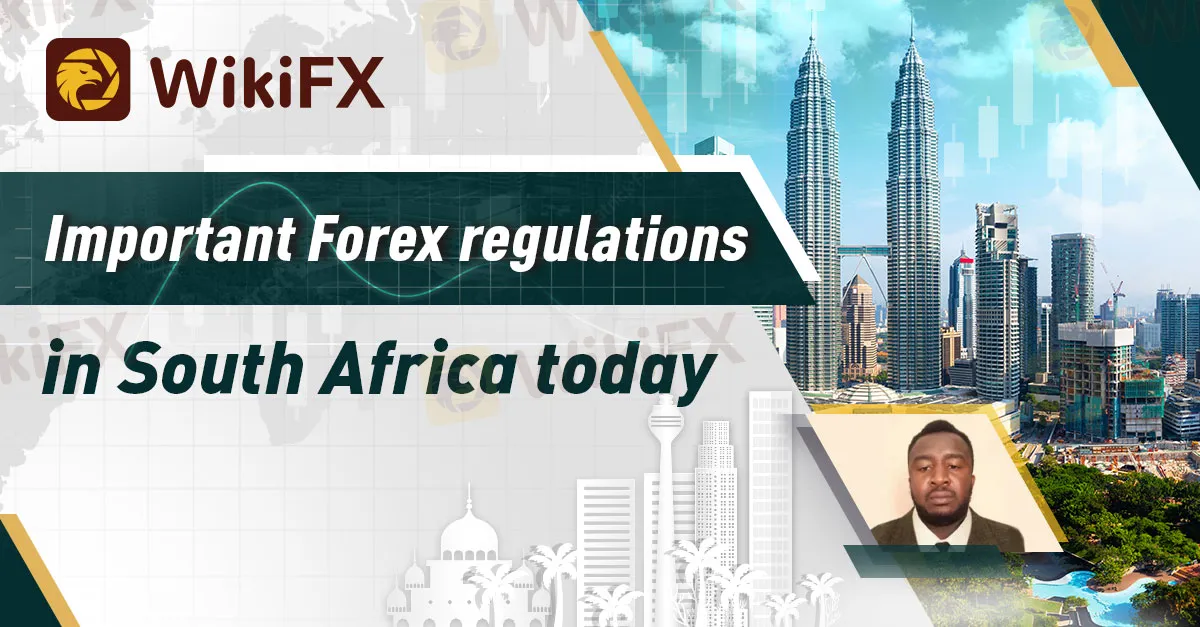简体中文
繁體中文
English
Pусский
日本語
ภาษาไทย
Tiếng Việt
Bahasa Indonesia
Español
हिन्दी
Filippiiniläinen
Français
Deutsch
Português
Türkçe
한국어
العربية
Important Forex regulations in South Africa today
Abstract:All gains from forex trading are considered capital gains in South African forex today. Hence, all forex traders in South Africa are expected to report their gains from forex trading to the relevant tax agency for tax deductions

By Chime Amara

Introduction
Forex trading is a legal business in South Africa, just as we find in every country today. However, there are important regulations guiding forex trading in each country today. These regulations define the standards to be observed by both traders and forex brokers rendering financial services within the country today.
Meaning of Forex regulations
Forex regulations are codes of conduct guiding forex trading within the country. These codes of conduct define the standards for carrying out forex transactions within the country.
Important Forex regulations guiding forex trading in South Africa today
Taxation: All forex traders residing in South Africa today are expected to pay tax on all profits made from forex trading. This trading applies to whether the trader made the gains using a foreign account or using a local account. All gains made from forex trading are considered capital gains and taxable in South Africa today.
License: Forex trading is a legitimate business in South Africa today. However, all forex brokers operating in South Africa are expected to obtain approvals and license from the country's financial services regulators known as the Financial Sector Conduct Authority (FSCA). This body scrutinizes the activities of all the brokers in South Africa to ensure they comply with the regulatory standards.
Age limit: Forex trading is a very risky business and as such open to only traders who have crossed the age of reason above 18 years to enable them take decisions.

Disclaimer:
The views in this article only represent the author's personal views, and do not constitute investment advice on this platform. This platform does not guarantee the accuracy, completeness and timeliness of the information in the article, and will not be liable for any loss caused by the use of or reliance on the information in the article.
Read more

Doo Financial Expands Regulatory Reach with Offshore Licenses in BVI and Cayman Islands
According to the report, Doo Group, a prominent Singapore-based online brokerage firm, has strengthened its global presence by securing new offshore licenses for its brokerage brand, Doo Financial. The company recently announced that entities under the Doo Financial umbrella have been granted licenses by two key offshore regulatory bodies: the British Virgin Islands Financial Services Commission (BVI FSC) and the Cayman Islands Monetary Authority (CIMA).

The Hidden Checklist: Five Unconventional Steps to Vet Your Broker
Forex broker scams continue to evolve, employing new tactics to appear credible and mislead unsuspecting traders. Identifying these fraudulent schemes requires vigilance and strategies beyond the usual advice. Here are five effective methods to help traders assess the legitimacy of a forex broker and avoid potential pitfalls.

Doo Financial Obtains Licenses in BVI and Cayman Islands
Doo Financial, a subsidiary of Singapore-based Doo Group, has expanded its regulatory footprint by securing new offshore licenses from the British Virgin Islands Financial Services Commission (BVI FSC) and the Cayman Islands Monetary Authority (CIMA).

CFI’s New Initiative Aims to Promote Transparency in Trading
A new programme has been launched by CFI to address the growing need for transparency and awareness in online trading. Named “Trading Transparency+: Empowering Awareness and Clarity in Trading,” the initiative seeks to combat misinformation and equip individuals with resources to evaluate whether trading aligns with their financial goals and circumstances.
WikiFX Broker
Latest News
AIMS Broker Review
The Hidden Checklist: Five Unconventional Steps to Vet Your Broker
YAMARKETS' Jingle Bells Christmas Offer!
Doo Financial Expands Regulatory Reach with Offshore Licenses in BVI and Cayman Islands
Why is there so much exposure against PrimeX Capital?
Russia to Fully Ban Crypto Mining in 10 Regions Starting January 1, 2025
MTrading’s 2025 "Welcome Bonus" is Here
Doo Financial Obtains Licenses in BVI and Cayman Islands
CFI’s New Initiative Aims to Promote Transparency in Trading
Currency Calculator


